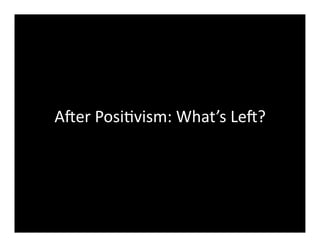Modernism Science and Uncertainty
- 1. A"er  Posi*vism:  Whatâs  Le"? Â
- 2. ââŠno  statement  which  refers  to  a  ârealityâ  transcending  the  limits  of  all  possible  experience  can  possibly  have  any  literal  signiïŹcance;  from  which  it  must  follow  that⊠ those  who  have  striven  to  describe  such  a  reality  have  all  been  devoted  to  the  produc*on  of  nonsense.â  Alfred  Jules  Ayer,  âThe  Elimina*on  of  Metaphysicsâ Â
- 3. Karl  Popper  (1902  â  1994) Â
- 4. Problem  No.  1:  âVeriïŹca*onâ  is  too  strong  a  criterion.  If  truth  value  requires  veriïŹca*on,  then  some  proposi*ons  can  never  be  considered  conclusively  true.  Â
- 5. âAll  sheep  are  white.â Â
- 6. âAll  sheep  are  white.â Â
- 7. âAll  sheep  are  white.â Â
- 8. veriïŹca*on  Moritz  Schlick  falsiïŹca*on  Karl  Popper Â
- 9. A.  J.  Ayer  (1910  â  1989) Â
- 10. strong  veriïŹability:  veriïŹca*on  that  makes  the  truth  value  of  a  proposi*on  certain  weak  veriïŹability:  veriïŹca*on  that  makes  the  truth  value  of  a  proposi*on  probable Â
- 11. âMost  sheep  are  white.â Â
- 12. Problem  No.  2:  The  Problem  of  Induc*on  induc5ve  reasoning:  extrac*ng  a  generaliza*on  from  speciïŹc  facts  or  cases.  Â
- 13. induc*ve  reasoning  1.⯠In  the  past,  most  sheep  have  been  white.  2.⯠Today,  most  sheep  are  white.  3.⯠Therefore,  in  the  future  most  sheep  will  probably  be  white. Â
- 14. induc*ve  reasoning  1.⯠In  the  past,  the  future  has  resembled  the  past.  2.⯠Today,  the  future  resembles  the  past.  3.⯠Therefore,  in  the  future,  the  future  will  probably  resemble  the  past. Â
- 15. Kurt  Gödel  (1906  â  1978) Â
- 16. Gödelâs  First  Incompleteness  Theorem   Any  eïŹec5vely  generated  theory  capable  of  expressing  elementary  arithme5c  cannot  be  both  consistent  and  complete.   In  par5cular,  for  any  consistent,  eïŹec5vely  generated  formal  theory  that  proves  certain  basic  arithme5c  truths,  there  is  an  arithme5cal  statement  that  is  true,  but  not  provable  in  the  theory. Â
- 17. In  other  wordsâŠ.  An  arithme*c  system,  for  instance  a  ïŹnite  set  of  axioms,  cannot  be  BOTH  consistent  and  complete. Â
- 18. whereâŠ.  Consistent  â>  contains  no  logical/mathema*cal  contradic*ons  Complete  â>  describes  all  possible  logical/ mathema*cal  statements. Â
- 19. In  other  wordsâŠ.  âŠthere  is  an  arithme*c  statement  that  is  true,  but  not  provable  by  the  theory.  Finite  lists  of  axioms  cannot  describe  a  system  where  all  statements  are  shown  to  be  true/ false. Â
- 20. What  does  that  mean  for  ra*onalism? Â
- 21. Logical  systems  can  not  be  universal  systems  of  thought. Â
- 22. âŠwhich  is  one  descrip*on  of:  Modernism Â
- 23. Things  fall  apart;  the  center  cannot  hold;  Mere  anarchy  is  loosed  upon  the  world⊠  William  Butler  Yeats,  â The  Second  Comingâ Â
- 24. âDid  you  love  your  father?â  âYes.â  âProve  it.â Â























